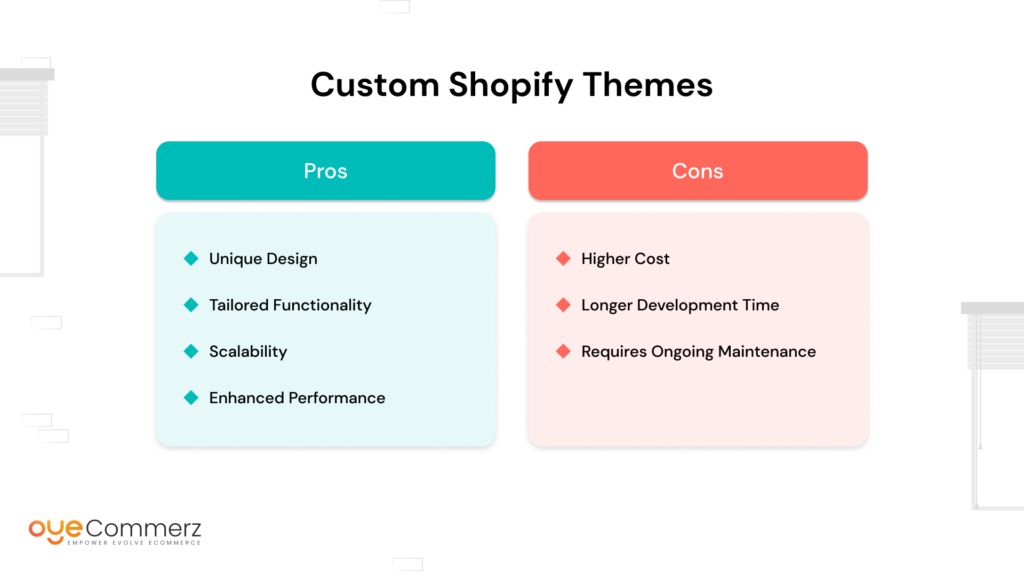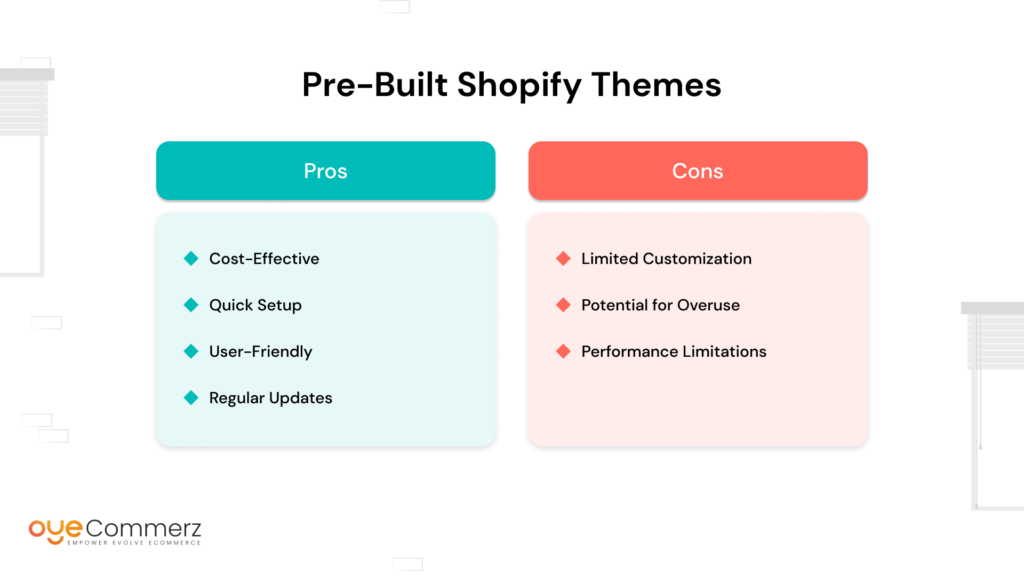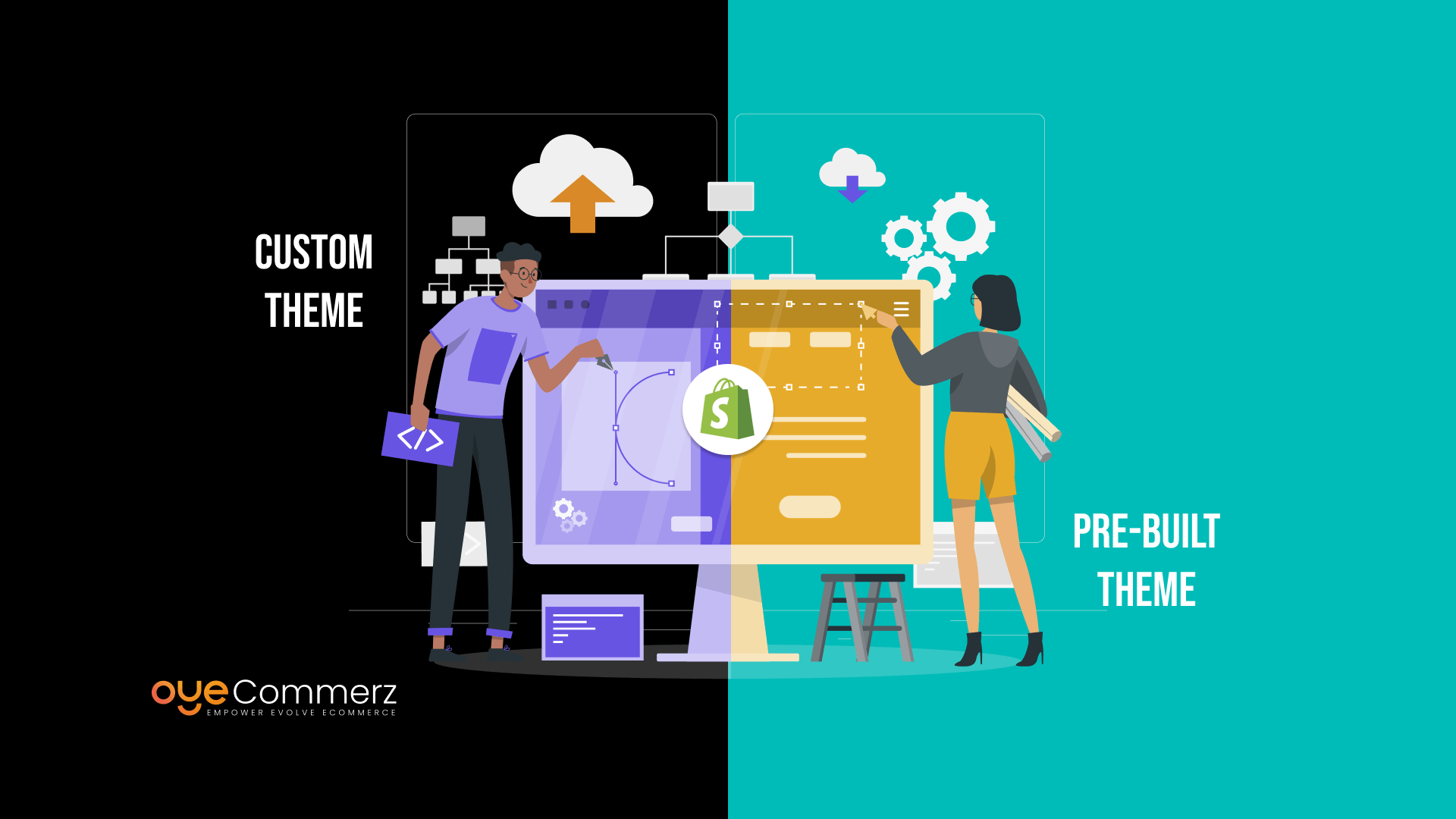Because the market of e-commerce is actively developing, the first impression plays a crucial role. To online retailers, the style of their website bears the potential to either entice or dissuade a customer and quite evidently affect the efficacy of the business. Like any other company, the major e-commerce store Shopify presents clients with several themes to choose from, each with its unique benefits and flaws.
But with such an impressive range of options out there, how does one choose whether to invest in a bespoke Shopify theme or buy a Shopify theme from a different store? This blog dives into the key considerations of Shopify theme development to help you decide whether a custom or pre-built theme is the right fit for your business. This blog will also shed light on how custom Shopify themes differ from pre-built Shopify themes, to enable people to make informed decisions about which one to use for their businesses.
Table of Contents
ToggleWhat Are Shopify Themes?
Shopify themes are website designs that consist of layouts that dictate the appearance of an online store. Essentially, they form the core of your Shopify site, defining every aspect of its design, including the overall layout, color scheme, typography, and interface structure. As mentioned earlier, a theme’s components include HTML, CSS, JavaScript, and Liquid, all working together to deliver an appealing and seamless online storefront.
This chapter highlights that themes are crucial for branding, customer engagement, and functionality. A well-designed theme not only enhances the visual appeal of a store but also effectively guides customers and makes online shopping more intuitive. Shopify themes can be broadly categorized into two types: custom themes and ready-made themes. By utilizing professional Shopify theme development services, businesses can craft themes that perfectly align with their brand identity and operational needs, ensuring both style and performance.
Role of Shopify Themes in E-commerce
The choice of the theme for your Shopify store is not just a mere appearance but it is as strategic as well. In the competitive world of e-commerce, a theme serves several critical functions:
Branding and Identity
An excellent and distinct theme enhances your brand and sets your store apart from the others hence making it famous. It helps to explain to your audience who you are as a business and in what way you are positioned, which strengthens the bond between the two.
User Experience (UX)
This is because a theme directly affects the behavior of the customer on the site. The poorly designed theme not only provokes the user’s dissatisfaction but having left your site, the person does not decide to become a buyer. On the other hand, a clean and clear design means an increased level of user satisfaction and thus higher chances for conversion.
Responsiveness and Compatibility
As the contemporary world is very much inclined towards mobile devices, any theme should feature responsiveness. The best Shopify theme guarantees the design’s adaptability in their different customary setups, including the desktop, tablet, or Smartphone.
Performance and Speed
A theme impacts attributes of your site that may include the speed or rate at which a site is loaded. A fast, optimized theme will cause enhancements to your site, including optimizing your Shopify theme for speed, which may directly translate to better search engine positioning as well as user feedback.
SEO Optimization
A good coding of the theme can improve your store’s search engine ranking to help customers locate it easily. Most themes are designed to enhance the site’s ranking factors in an SEO-friendly manner hence improving organic traffic.
Since theme influences such aspects as look and feel, functionality, conversion rate, and more, it is important to select a proper one for the business.
Types of Shopify Themes: Custom vs. Pre-built
When it comes to selecting a theme for your Shopify store, you have two main options: custom themes and the available prebuilt themes. Both types have their pros and cons based on the company’s requirements and objectives.
Custom Shopify Themes

A custom Shopify theme is a design that has been developed to meet your company’s particular needs. This kind of theme is developed from the ground up or significantly customized to reflect your brand, your audience, your competitive advantages, or your USPs. Usually, custom themes are created by professionals who know the platform of Shopify as well as the coding languages used in it, ensuring best practices for coding Shopify themes are followed
Pros
- Unique Design: There are no limitations in design when using a custom theme which means that users can design a store that has a unique and specific look that will set it apart from the rest.
- Tailored Functionality: If you choose a custom theme, there are certain useful features and options you can include which for your business are crucial, thus making the experience for the clients even more pleasant.
- Scalability: The custom themes can be designed in such a way that there is provision for the addition of the new themes, and other related features and functionalities as the business expands.
- Enhanced Performance: Custom themes are usually enhanced for performance, and this means that they load faster and present fewer issues to clients.
Cons
- Higher Cost: While creating a custom theme is possible, it is costly since it often involves the work of professional theme developers and designers. This option, however, may not suit businesses that are in their early stage of development or small businesses that have greatly limited budgets.
- Longer Development Time: In addition and not least, the process of having one developed from the ground up might take anything from two weeks to a month or two, depending on the intricacies of the custom theme as well as other components necessary for its creation.
- Requires Ongoing Maintenance: Dedicated themes may need constant updates and changes to support several Shopify platform updates and changes
Pre-built Shopify Themes

There are template themes that are ready and available in the marketplace and these can be purchased and easily implemented in the store. These themes are developed by independent developers and can be gotten through the Shopify Theme Store or third-party theme providers.
Pros
- Cost-Effective: There is usually a higher initial cost for pre-built themes as compared with custom themes, although they are cheaper and ideal for start-ups and firms with minimal capital.
- Quick Setup: Pre-built themes, as the name suggests a ready-made themes and hence can be installed and customized in a matter of hours or days depending on the time taken to complete the setup of your store.
- User-Friendly: There are pre-designed templates of themes that have existing aspects incorporated in the form of tools, and interfaces for seamless modification without requiring a lot of programming expertise.
- Regular Updates: A lot of pre-built themes are updated more often by their creators to support new features of Shopify constantly releasing updates for the platform.
Cons
- Limited Customization: Pre-built themes provide a limited level of adjusting according to one’s preference since they are not as flexible as a custom theme. This can lead to templates that can look almost boring and hereby lack total compliance with your brand.
- Potential for Overuse: Another disadvantage of using pre-built themes is that several users have access to the theme making your store themes similar to others.
- Performance Limitations: Most templates when chosen are not very efficient in as much as loading and performance are concerned, therefore a poor experience is expected.
When to Choose a Custom Theme for Your Business
Selecting a custom Shopify theme can be beneficial to the business aiming at making their online store visually distinguish it from the rest of the similar stores. Here are some scenarios where a custom theme might be the best option:
You Have Specific Design Requirements: If your brand demands unique graphic elements or if your website has a specialized structure that doesn’t align with standard HTML frameworks, opting for a custom theme is essential. This approach allows you to fully express your brand’s personality through design, offering a tailored experience that resonates with your target audience. By following the best practices for customizing Shopify Plus themes, businesses can not only save time but also achieve a distinctive, cohesive design that aligns perfectly with their brand identity.
- You Need Advanced Functionality: If a business has specific needs that cannot be addressed by pre-built themes, then a custom theme is going to be just what the doctor ordered.
- You Want to Stand Out from Competitors: If there are lots of competitors in the market, a custom theme can be used as a selling point as it will make the shopping experience of your customers unique.
- You Have the Budget and Resources: Customized themes are expensive due to the time that it takes to create them. Nevertheless, if the company has enough capital and materials to engage in acquiring a unique theme, it is worthwhile since the returns are worth it.
When Is a Pre-built Theme The Right Choice
Certainly, for many ventures – with special emphasis on modern start-ups and small-scale enterprises – getting an existing Shopify theme can be a wise decision. Here are some situations where a pre-built theme might be the best choice:
- You’re Launching a New Store on a Tight Budget: There are a lot of themes that are open for purchase and are not exclusive which may cost less than the custom theme making it suitable for new business organizations. It helps you to begin establishing your store online without necessarily having to go through the great effort of plan development.
- You Need to Launch Quickly: Well, if you are in a hurry to get your store opened, then using the pre-built theme is one of the best options. Most of the setting up of the software takes a short amount of time and doesn’t occupy too much of your time, leaving you free for other activities such as advertising or stock control.
- You Have Limited Technical Knowledge: Pre-built themes are superb for store owners who don’t have any coding knowledge as they come partially coded to help make a tasteful headline. Through pre-built themes, basic layout modifications can be made with no prior coding know-how.
- You’re Testing the Market: A pre-built theme when trying out a new product or testing the waters of a certain market helps to minimize the exposure in case the business idea will not turn out to be successful or as predicted, thus helping cut down on losses or a complete flopped business.
Selecting the Right Solution for Your Business
There are crucial factors that, when considered may help a business owner decide whether it is best to settle for a custom Shopify theme or a built-in one that is ready for use. To make the right decision, consider the following factors:
Budget
Establish what amount you are ready to spend on the design of your store. For those who want to save their money, the best option would be to choose one of the numberless pre-built themes. But if one is in a position to fund it and stay focused on making a unique brand image, then one has to go for custom themes because they are a worthy investment.
Timeline
Think about how soon you are going to need your store online. In case you face time constraints then a pre-built theme can be helpful because it saves time. However, if the person wants the additional time to cater to a unique design, then maybe the custom themes will be more appropriate.
Technical Expertise
Evaluating one’s technical competencies and information base is ranked ninth among the best practices. If you’re not interested in design limitations and are willing to work with HTML and CSS too, then custom themes are perfect for you. If the ‘do it yourself’ approach is not your cup of tea, opting for a pre-built theme may be the best course to follow.
Business Goals
Think about your business development and how the store layout will support it in the future. If your main goal is to brand yourself and stand out from other websites, then having your custom theme may give you the freedom that is necessary to do just that. If you don’t want to spend a long time creating a website and you’re more concerned with putting out a basic design to assess the market reaction, then a pre-built theme would be ideal.
Tailor Your Store to Perfection with OyeCommerz!
At OyeCommerz, we specialize in both custom and pre-built Shopify themes designed to match your business needs and brand identity. Whether you’re looking for a unique, fully customized solution or a budget-friendly pre-built theme, our expert team can guide you every step of the way. Let us help you create a stunning, high-performing online store that stands out from the competition and drives conversions.
Contact us today to find out which Shopify theme is best for your business and start transforming your e-commerce journey!
Contact to Migrate your Site to Shopify Now
Conclusion
Selecting the right Shopify theme is a pivotal choice that can greatly influence the success of your online store. Whether you choose a custom-built or pre-designed theme, it’s essential to align your decision with your business’s unique needs, objectives, and available resources. By leveraging expert Shopify theme development services, you can better assess the strengths and limitations of each option and make a well-informed choice that suits your brand. The right theme, when developed with precision, can create an engaging, memorable shopping experience for your customers, ultimately driving long-term growth and success for your business.


